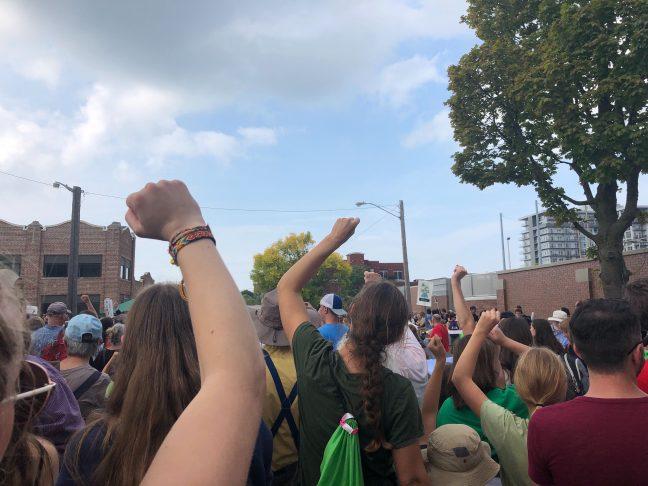President Donald Trump held a Wisconsin Community Safety Roundtable meeting in Kenosha, Wisconsin last month in response to destruction of property from riots after a 29-year-old Black man, Jacob Blake, was shot seven times in the back by a police officer in August.
According to C-SPAN, Trump was joined by U.S. Attorney General William Barr and acting Secretary of Homeland Security Chad Wolf, as well as several state and local officials and Kenosha business owners.
During the meeting, Trump said he was committed to helping Kenosha rebuild through providing funding.
The New York Times reported that during the visit, Trump toured buildings damaged in the protests, met law enforcement officials and called for a crackdown on violent demonstrations. He did not meet with Blake’s family.
“It’s a complicated subject to be honest with you,” Trump said during the meeting. “But I feel terribly for anyone that has to go through that.”
During the roundtable meeting, Trump said he will provide $1 million to Kenosha law enforcement, nearly $4 million to the small businesses that burned down and $42 million to “support public safety statewide.”
Crowd of 500 met with tear gas after smashing windows, looting in protest of shooting of Jacob Blake
Trump also said the $42 million includes direct support for law enforcement and funding for additional prosecutors to punish criminals and resources to provide services to victims of crimes.
But, according to a letter to the president from Gov. Tony Evers, D-Wis., and U.S. Senator Tammy Baldwin, D-Wis, the funding Trump announced in Kenosha will not be sufficient to rebuild and heal the Kenosha community.
“We welcome your commitments, but are dismayed that the funding you announced in Kenosha will not be sufficient to rebuild and heal the Kenosha community,” Evers and Baldwin wrote.
During the roundtable meeting, Trump promised multiple business owners a hand in the rebuilding process.
Riki Tagliapietra, owner of two downtown businesses that were vandalized, is one example.
“We’ll be talking to you. We’re going to be helping you with law enforcement and we’re going to be helping you with some economic development,” Trump said to Tagliapietra. “Get it back in shape. Get Kenosha back in shape, and we’ll get it back in, I think, very quickly.”
During the meeting, Trump also promised a “complete rebuild” to John Rode, owner of Rode’s Camera Shop, which was in business 109 years. Rode declined to appear at a photo op after receiving an invitation from the White House, accusing Trump of using the destroyed store for political gain.
But according to an email statement from Baldwin’s office, the $4 million Trump announced for small businesses cannot be used for damages tied to unrest because it is from a CARES Act Recovery Assistance grant to the Kenosha Area Business Alliance, Inc.
“This includes $3.61 million to support a revolving loan fund to lend to small businesses and entrepreneurs in Kenosha County affected by the coronavirus pandemic,” Baldwin’s office wrote. “It also includes $361,000 for administrative costs.”
The CARES Act provided the Economic Development Administration with $1.5 billion for economic development assistance programs to help communities prevent, prepare for and respond to COVID-19.
These funds can’t be used for damaged small businesses, Baldwin’s office wrote, as Trump said during the roundtable discussion.
According to University of Wisconsin Professor at the School of Journalism and Mass Communication Michael Wagner, Trump isn’t worried about the repercussions of making these false promises.
“It’s fair to say that the President does not worry about the consequences of saying things that are not true,” Wagner said. “He says things that are not true and makes promises about the things he is going to do that never come true.”
Evers and Baldwin wrote the only new funding Trump announced was the $1 million for Kenosha law enforcement.
During the roundtable meeting, Trump said it is extra money to “go out and do what you have to do” and his administration is restoring public safety, such as hiring more police, surging tough-on-crime federal prosecutors and increasing penalties for assaulting law enforcement.
Kenosha arrests raise questions about policing in Dane County
According to Wagner, there is confusion over what it means to “defund the police.”
“I think some people think that means abolish the police or close down all the police stations, which is not what most people mean when they say that,” Wagner said.
Defunding the police means a sizeable chunk of a city’s budget is invested in communities, especially marginalized ones where much of the policing occurs instead of funding a police department.
Evers and Baldwin ended their letter with a request for increased federal aid from Trump.
“Kenosha needs real solutions, not empty gestures,” Evers and Baldwin wrote. “We are asking you to provide federal aid that will actually help the community, along with its residents and businesses, rebuild.”














